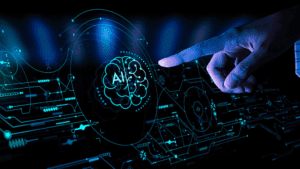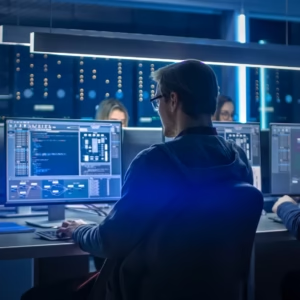Introduction

In today’s digital age, the word cybersecurity often pops up in conversations, especially when discussing data breaches or hacking incidents. But what exactly is cybersecurity, and why is it so crucial? On the other hand, Artificial Intelligence (AI) is a term that’s equally popular, often associated with futuristic technology and smart devices. So, what happens when these two fields intersect? Will AI replace traditional cybersecurity methods? Let’s dive into this intriguing topic.
What is Cybersecurity?
Cybersecurity refers to the practices and technologies designed to protect computers, networks, and data from unauthorized access, attacks, or damage. It’s like a digital security guard, ensuring that sensitive information stays safe and out of the wrong hands.
What is AI?
Artificial Intelligence, or AI, involves creating machines that can mimic human intelligence. This includes learning from data, recognizing patterns, making decisions, and even predicting future outcomes. Think of AI as a super-intelligent assistant that can process information much faster than a human ever could.
The Intersection of Cybersecurity and AI
Combining cybersecurity and AI might sound like something out of a sci-fi movie, but it’s very much a reality. AI can analyze vast amounts of data quickly, detect unusual patterns, and respond to threats almost instantaneously. This makes it a powerful tool in the fight against cybercrime.
Current State of Cybersecurity
Traditional Cybersecurity Measures
Traditional cybersecurity measures include firewalls, antivirus software, intrusion detection systems, and encryption. These tools have been the backbone of digital security for years, helping to block unauthorized access and protect sensitive information.
Challenges in Cybersecurity
Despite these measures, cyber threats continue to evolve. Hackers are becoming more sophisticated, and new vulnerabilities are discovered regularly. This makes it challenging for cybersecurity professionals to keep up and ensure that their defenses are always up to date.
Rise of AI in Cybersecurity
How AI is Being Used in Cybersecurity Today
AI is already making waves in the cybersecurity world. It’s used to monitor network traffic, detect anomalies, and even predict potential threats before they occur. By analyzing vast amounts of data in real time, AI can identify patterns that might indicate a cyber attack.
Examples of AI in Cybersecurity
Some notable examples of AI in cybersecurity include:
- IBM’s Watson for Cyber Security: Watson can process millions of data points in seconds, helping to identify threats and provide recommendations.
- Darktrace: This AI system learns the normal behavior of a network and detects deviations that could indicate a breach.
- Vectra AI: Uses machine learning to identify hidden attackers in real time.
Advantages of AI in Cybersecurity
Speed and Efficiency
One of the biggest advantages of AI is its speed. While a human might take hours or even days to analyze data and identify a threat, AI can do it in seconds. This rapid response time is crucial in preventing or mitigating cyber attacks.
Predictive Capabilities
AI’s ability to predict future threats is another significant advantage. By analyzing past data and identifying patterns, AI can forecast potential vulnerabilities and suggest preemptive measures.
Reducing Human Error
Humans are prone to errors, especially when dealing with complex systems and vast amounts of data. AI can help reduce these errors by automating repetitive tasks and providing more accurate analyses.
Challenges and Limitations of AI in Cybersecurity
False Positives and Negatives
AI isn’t perfect. It can sometimes generate false positives (flagging legitimate activity as a threat) or false negatives (missing an actual threat). These inaccuracies can lead to unnecessary disruptions or overlooked vulnerabilities.
Dependency on Data Quality
AI systems rely heavily on the quality of the data they’re trained on. If the data is biased or incomplete, the AI’s performance will suffer. Ensuring high-quality, comprehensive data is essential for effective AI-driven cybersecurity.
Ethical and Privacy Concerns
Using AI in cybersecurity raises ethical and privacy issues. There’s a fine line between monitoring for threats and infringing on individuals’ privacy. Balancing security and privacy is a delicate task that requires careful consideration.
Will AI Replace Cybersecurity?
Arguments for AI Replacing Cybersecurity
Proponents of AI in cybersecurity argue that AI’s speed, efficiency, and predictive capabilities make it superior to traditional methods. They believe that as AI technology advances, it will eventually be able to handle all aspects of cybersecurity without human intervention.
Arguments Against AI Replacing Cybersecurity
On the other hand, many experts argue that AI cannot fully replace human cybersecurity professionals. They highlight the importance of human intuition, experience, and ethical judgment, which AI lacks. Cybersecurity is not just about technology; it’s also about understanding human behavior and motives.
The Future of Cybersecurity with AI
AI as a Tool for Cybersecurity Professionals
Rather than replacing cybersecurity professionals, AI is more likely to serve as a powerful tool that enhances their capabilities. AI can handle the heavy lifting, analyzing data and identifying threats, while humans can focus on strategy and decision-making.
The Need for Human Oversight
Human oversight is crucial in ensuring that AI systems are functioning correctly and ethically. Cybersecurity professionals will still be needed to interpret AI findings, make critical decisions, and address complex scenarios that AI cannot handle on its own.
Collaboration Between AI and Human Experts
The future of cybersecurity lies in the collaboration between AI and human experts. By working together, they can create a more robust and effective defense against cyber threats. AI can provide the speed and efficiency, while humans bring intuition and ethical judgment.
Conclusion
In conclusion, while AI is revolutionizing the field of cybersecurity, it is unlikely to replace human professionals entirely. Instead, AI will complement and enhance human efforts, leading to more effective and efficient cybersecurity measures. The future of cybersecurity will be a collaborative effort between AI and humans, combining the best of both worlds to protect against ever-evolving cyber threats.
FAQs
Will AI completely take over cybersecurity jobs?
No, AI will not completely take over cybersecurity jobs. While AI can handle many tasks more efficiently than humans, the need for human oversight, intuition, and ethical judgment remains critical.
How can businesses prepare for AI in cybersecurity?
Businesses can prepare for AI in cybersecurity by investing in AI-driven security tools, training their staff on AI technologies, and fostering a collaborative environment where AI and human expertise work together.
What are the potential risks of relying on AI for cybersecurity?
The potential risks include false positives and negatives, dependency on data quality, and ethical and privacy concerns. Ensuring high-quality data and maintaining human oversight can help mitigate these risks.
Can AI improve current cybersecurity measures?
Yes, AI can significantly improve current cybersecurity measures by providing faster, more accurate threat detection, predictive capabilities, and reducing human error.
Is AI the future of cybersecurity?
AI is undoubtedly a significant part of the future of cybersecurity, but it will not replace human professionals. Instead, AI and humans will work together to create more robust and effective security solutions.





